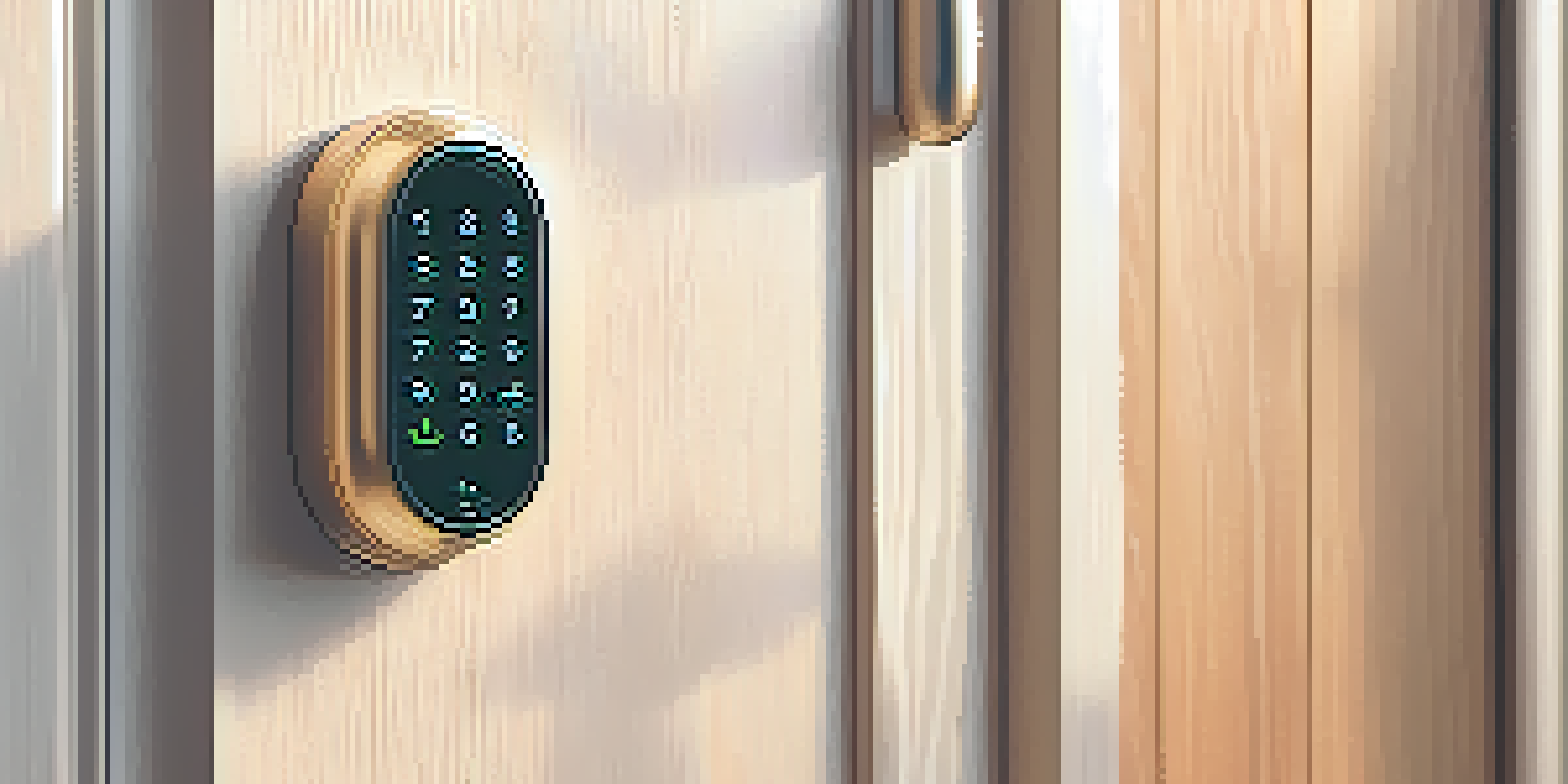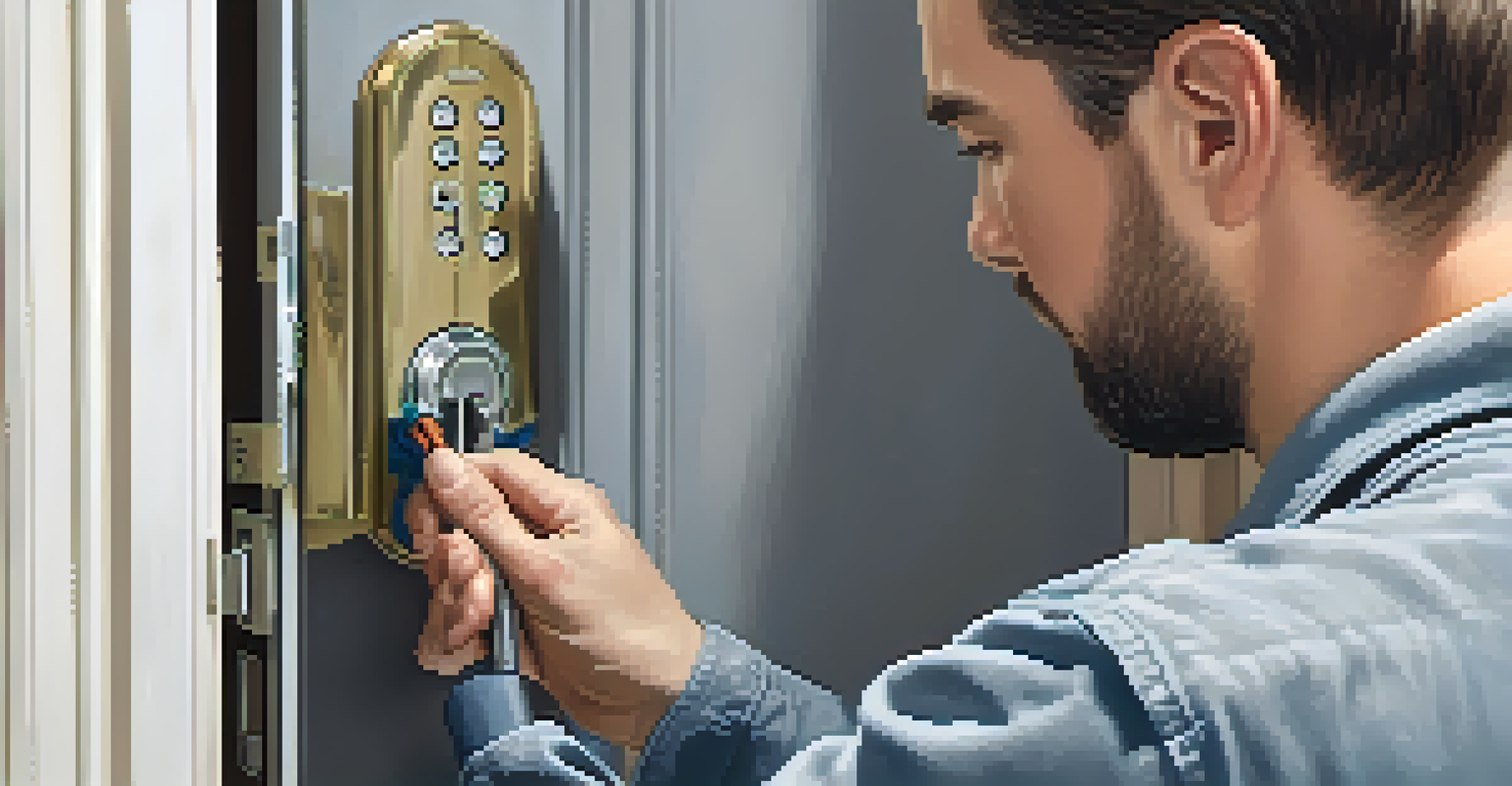How to Improve Home Safety with Smart Locks

Understanding Smart Locks: What They Are and How They Work
Smart locks are innovative devices that allow you to secure your home using technology. Instead of traditional keys, they utilize keypads, smartphones, or biometrics to grant access. This means you can lock or unlock your door from anywhere, providing unparalleled convenience.
The best way to predict the future is to invent it.
One of the key advantages of smart locks is remote access. Imagine being able to let in a friend or service provider while you're at work, all with a few taps on your phone. This feature can be especially useful when you're on vacation or simply out for the day.
Many smart locks also offer features like temporary codes for guests and activity logs to keep track of who enters your home. These functionalities not only enhance security but also give you peace of mind, knowing you have control over who accesses your space.
The Benefits of Upgrading to Smart Locks for Home Security
Transitioning to smart locks can significantly boost your home security. Unlike traditional locks that can be picked or bumped, many smart locks come equipped with advanced encryption and security protocols. This makes it much harder for potential intruders to gain access.

Additionally, smart locks can send alerts to your smartphone whenever someone enters or exits your home. This real-time feedback allows you to stay informed about who is coming and going, providing an extra layer of security.
Smart Locks Enhance Home Security
Smart locks provide advanced security features like remote access and activity logs, making it easier to monitor who enters your home.
Moreover, with features like auto-locking, you won't have to worry about whether you remembered to lock the door when you leave. This added convenience can help reduce the chances of leaving your home vulnerable.
Choosing the Right Smart Lock for Your Home Needs
Selecting a smart lock can feel overwhelming, given the variety available on the market. It's important to consider factors such as compatibility with your existing door hardware, the type of access methods you prefer (like keypads or fingerprint scanners), and your budget.
Security is not a product, but a process.
Another vital aspect is the lock's integration with other smart home devices. If you already have a smart home ecosystem, look for locks that can seamlessly connect with your system for added convenience and functionality.
Reading reviews and seeking recommendations can also guide you in making the right choice. By doing a bit of research, you can find a smart lock that not only meets your security needs but also fits your lifestyle.
Installation Tips for Your New Smart Lock
Installing a smart lock can typically be done as a DIY project, but it's essential to follow the manufacturer's instructions carefully. Most smart locks come with detailed guides that make the process straightforward, often requiring just basic tools.
Before starting, ensure you have all the components and tools ready. It's a good idea to double-check your door's compatibility with the lock you’ve chosen to avoid any surprises during installation.
Choosing the Right Smart Lock
Selecting a smart lock involves considering compatibility, access methods, and integration with existing smart home devices.
If you're not comfortable with DIY projects, consider hiring a professional. A properly installed smart lock will function effectively, ensuring your home remains secure and providing you with peace of mind.
Integrating Smart Locks with Your Home Security System
Integrating your smart lock with an existing home security system can maximize your safety. Many modern security systems allow for the addition of smart locks, enabling you to control all aspects of your security from one central hub.
This integration means alerts from your smart lock can trigger the entire system, making it more responsive to potential breaches. For instance, if someone tries to tamper with your lock, your security cameras can start recording automatically.
Additionally, having everything interconnected makes managing your home security simpler. You can monitor your doors, cameras, and alarms from a single app, streamlining your safety measures.
Maintaining Your Smart Lock for Optimal Performance
Regular maintenance is crucial for ensuring your smart lock functions effectively over time. This includes checking the battery life, cleaning the lock, and updating any software if necessary. Most smart locks will notify you when a battery change is needed.
It’s also important to periodically review your access codes and user permissions. If someone no longer needs access to your home, such as an old housekeeper or a friend, make sure to delete their code to maintain security.
Maintaining Smart Locks is Key
Regular maintenance, including software updates and battery checks, is essential for optimal performance and security of your smart lock.
Finally, keep an eye on software updates from the manufacturer. These updates often include security enhancements that protect your device from emerging threats, ensuring your smart lock remains a secure part of your home.
Addressing Common Concerns About Smart Locks
Many homeowners worry about the reliability of smart locks, especially during power outages or if the internet goes down. However, most smart locks are designed to function offline and have backup options like traditional keys to ensure you’re not locked out.
Another common concern is cybersecurity; after all, a smart lock is essentially a computer on your door. To mitigate risks, choose locks from reputable manufacturers, frequently update passwords, and enable two-factor authentication when available.

Finally, familiarize yourself with the troubleshooting steps for your specific lock. Knowing how to reset or troubleshoot can help you feel more confident in your lock's reliability, allowing you to enjoy the benefits of smart technology without worry.